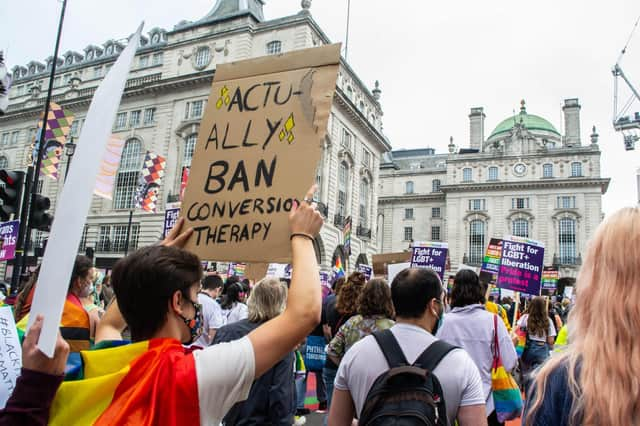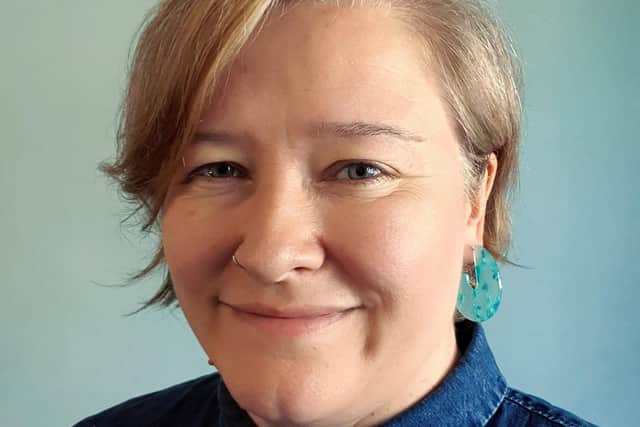LGBT+ History Month: Conversion therapy and access to IVF on NHS still two major issues


While LGBT+ History Month is an opportunity to look back at key moments in the fight for equality and the trailblazers who have come before, it’s also a chance to look forward.
The news cycle might paint quite a bleak picture of life in the LGBT+ community – particularly with recorded homophobic and transphobic hate crimes on the rise – but Nancy Kelley, chief executive of Stonewall feels positive about the future.
Advertisement
Hide AdAdvertisement
Hide Ad“It’s my job to feel hopeful,” she says simply. “It’s my job to make sure to fight with others in the movement to make sure we get a positive outcome.”


Kelley adds: “It’s really relevant to LGBT History Month actually – I think a lot about Michael Cashman (one of the founders of Stonewall), Lisa Power (activist), Ian McKellen – I think about what they lived through, and what they did.
"I think about all the LGBTQ people that came before me, whose names we don’t know, because they weren’t famous activists – they were just incredibly brave people going about their daily lives, and insisting other citizens see them and recognise them as they are. I think about how much they were able to change, and that gives me enormous hope – not that we will win all the fights now, but that we will win all of the fights eventually… And we can all be part of making that happen.”
Kelley feels particularly positive when she considers how much has changed in her own lifetime – allowing her to now be married to a woman, and be an adopter – making her “think about the potential for change in the future for the lifetime of my children”.
Advertisement
Hide AdAdvertisement
Hide AdBut there are two particular issues she feels particularly hopeful will change in the near future.
The first is conversion therapy.
“Conversion therapy, or so-called conversion therapy, are practices that are trying to change or suppress who we are at the basic level,” explains Kelley. “So they’re trying to make lesbian, gay, bi, ace (asexual) people’s sexual orientation change, they’re designed to make trans people’s gender identity change.”
Kelley says conversion therapy doesn’t work, “because these are really fundamental parts of who we are, and there’s a lot of evidence that they cause very significant long-term psychological harm”.
Stonewall’s CEO indicates there’s “a broader social value” to banning conversion therapy, because it “supports and underlines the idea that there’s something wrong with who we are – we’re beautiful just as we are”.
Advertisement
Hide AdAdvertisement
Hide AdKelley feels hopeful the UK government will implement a full ban soon, because “globally there is a campaign to end the abuse of conversion therapy gathering incredible pace”.
For Kelley, it’s important legislation “doesn’t leave loopholes that allow for these really horrific abuses to continue” – giving the example of adults being able to ‘consent’ to conversion therapy as a potentially damaging caveat.
The second issue is unequal access to fertility treatment on the NHS Kelley calls this “one of those areas of inequality that a lot of people don’t know exists – and unfortunately, when people discover it is often when it’s directly harming them”.
In England, access to fertility treatments differs depending on where you live, as NHS funding allocation is decided by local clinical commissioning groups (CCGs).
Advertisement
Hide AdAdvertisement
Hide AdFor same-sex couples who want to have fertility treatment, many find they face the additional hurdle of having to privately pay for three to 12 rounds of IUI (intrauterine insemination, which has a lower success rate than IVF) before being offered one round of IVF on the NHS.
“What that means, in effect, is only wealthy couples can access NHS IVF,” explains Kelley. “And this is just wrong… It shouldn’t be the case that money is a barrier to becoming a parent.”